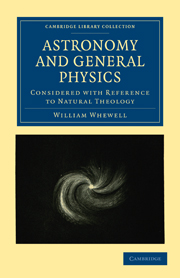Book contents
- Frontmatter
- NOTICE
- Contents
- INTRODUCTION
- BOOK I TERRESTRIAL ADAPTATIONS
- BOOK II COSMICAL ARRANGEMENTS
- BOOK III RELIGIOUS VIEWS
- CHAP. I The Creator of the Physical World is the Governor of the Moral World
- CHAP. II On the Vastness of the Universe
- CHAP. III On Man's Place in the Universe
- CHAP. IV On the Impression produced by the Contemplation of Laws of Nature; or, on the Conviction that Law implies Mind
- CHAP. V On Inductive Habits; or, on the Impression produced on Men's Minds by discovering Laws of Nature
- CHAP. VI On Deductive Habits; or, on the Impression produced on Men's Minds by tracing the consequences of ascertained Laws
- CHAP. VII On Final Causes
- CHAP. VIII On the Physical Agency of the Deity
CHAP. IX - On the Impression produced by considering the Nature and Prospects of Science; or, on the Impossibility of the Progress of our Knowledge ever enabling us to comprehend the Nature of the Deity
from BOOK III - RELIGIOUS VIEWS
Published online by Cambridge University Press: 05 August 2011
- Frontmatter
- NOTICE
- Contents
- INTRODUCTION
- BOOK I TERRESTRIAL ADAPTATIONS
- BOOK II COSMICAL ARRANGEMENTS
- BOOK III RELIGIOUS VIEWS
- CHAP. I The Creator of the Physical World is the Governor of the Moral World
- CHAP. II On the Vastness of the Universe
- CHAP. III On Man's Place in the Universe
- CHAP. IV On the Impression produced by the Contemplation of Laws of Nature; or, on the Conviction that Law implies Mind
- CHAP. V On Inductive Habits; or, on the Impression produced on Men's Minds by discovering Laws of Nature
- CHAP. VI On Deductive Habits; or, on the Impression produced on Men's Minds by tracing the consequences of ascertained Laws
- CHAP. VII On Final Causes
- CHAP. VIII On the Physical Agency of the Deity
Summary
If we were to stop at the view presented in the last chapter, it might be supposed that—by considering God as eternal and omnipresent, conscious of all the relations, and of all the objects of the universe, instituting laws founded on the contemplation of these relations, and carrying these laws into effect by his immediate energy,—we had attained to a conception, in some degree definite, of the Deity, such as natural philosophy leads us to conceive him. But by resting in this mode of conception, we should overlook, or at least should disconnect from our philosophical doctrines, all that most interests and affects us in the character of the Creator and Preserver of the world;—namely, that he is the lawgiver and judge of our actions; the proper object of our prayer and adoration; the source from which we may hope for moral strength here, and for the reward of our obedience and the elevation of our nature in another state of existence.
We are very far from believing that our philosophy alone can give us such assurance of these important truths as is requisite for our guidance and support; but we think that even our physical philosophy will point out to us the necessity of proceeding far beyond that conception of God, which represents him merely as the mind in which reside all the contrivance, law, and energy of the material world.
- Type
- Chapter
- Information
- Publisher: Cambridge University PressPrint publication year: 2009First published in: 1833



